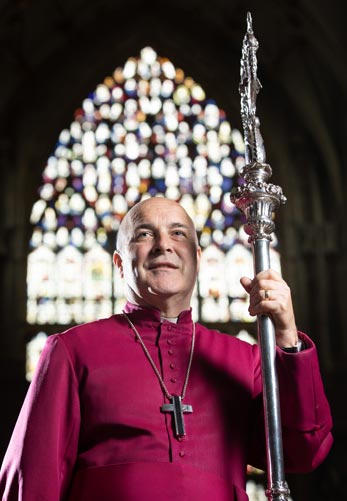
The Most Reverend and Right Honourable
Stephen Cottrell
The Lord Archbishop of York
Read Stephen Cottrell's Foreword to
The Churchwarden's Yearbook 2022
In my time as Bishop of Chelmsford, the largest multi parish benefice in the diocese had 14 parishes. I have a photograph from the evening I instituted the new Team Rector. There I am, lined up outside the church with 28 churchwardens. In amongst the staves, I think there may be one or two broom handles and cricket stumps. We are all smiling. The Benefice worked well together, and among the reasons it worked so well were the churchwardens. Even though the days when every parish church had its own parish priest were long gone, the office and presence of the churchwarden enabled the individual identity and ministry of each parish church to be maintained and to flourish within the whole. Borrowing Paul’s analogy of the body, they were the ligaments that kept it together. And the heart that kept each church beating. Maintaining the presence and ministry of the church in all our communities is a huge challenge. As we emerge from the horrors and sadness of Covid19, in many ways it seems harder still. Many parishes, especially in rural areas, can’t find people to serve as churchwarden. Nevertheless, it is this office which does so much to bind the Church of England together and root us in the communities we serve. In the future things will change. The Church of England is trying to be a simpler and humbler church. We long to be a more Christ centred, working together to make Jesus known. Part of this will be a revitalisation of the parish system. One of our strategic objectives is to be a church where mixed ecology is the norm. What that means is developing and nurturing new ways of being Church so that every person in every community has an opportunity to hear the good | news of Jesus Christ and be part of a Christian community. We are doing its already. From chaplaincies in schools and hospitals to midweek messy Church, we have always known that there are different ways of expressing Christian community and therefore different pathways into Christian belonging. This is the heart of what it is to be parish: a church for everyone. Therefore, within our existing parish communities (and growing from them and alongside them) we envisage a Church of England with greater diversity, and present in every community. We envisage a future with more churches, but much greater variety. All within a renewed parish system. We won’t be able to do it without local leadership and local ministry. But because we are the one Church of Jesus Christ, unity with one another and unity across the mixed ecology of church communities will also be essential. The office of churchwarden will, therefore, be as important as ever. Perhaps more important. A churchwarden is a local person and member of the local congregation and an officer of the Bishop. Churchwardens embody the local and universal compass of the Church. This historic office has an exciting and significant future.
That is a wonderful thing, and, therefore, the most important thing I need to write in this Foreword is thank you One of the main reasons the Church of England is able fulfil its historic vocation of being the church for everyone everywhere, is because of churchwardens and the vital part they play. I therefore write these words with huge gratitude. Thank you for all you do for the proclamation of the gospel and the welfare of the Church.
++ Stephen Ebor: Archbishop of York |
